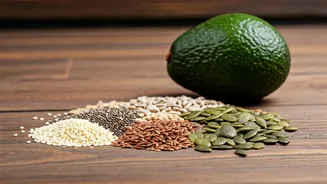Seeds: Nature's Cholesterol Fighters
Seeds, often underestimated, are nutritional powerhouses packed with compounds that can significantly impact cholesterol levels. They offer a natural approach
to managing heart health, potentially reducing the need for medication and associated side effects. These tiny marvels are rich in fiber, which helps bind cholesterol in the digestive system, preventing its absorption into the bloodstream. Furthermore, many seeds contain plant sterols and stanols. These compounds compete with cholesterol for absorption, effectively lowering the amount of cholesterol that enters the body. Seeds also offer healthy fats, such as omega-3 fatty acids, which can help reduce inflammation and improve overall cardiovascular well-being. Incorporating seeds into your diet is a straightforward yet effective strategy for supporting a healthy heart and maintaining optimal cholesterol levels naturally. Their versatility allows for easy integration into meals, snacks, and beverages, making heart-healthy eating both achievable and enjoyable.
Flax Seeds: Heart Health Boosters
Flax seeds are renowned for their exceptional ability to lower cholesterol, making them a cornerstone of a heart-healthy diet. These tiny seeds are an outstanding source of soluble fiber, which forms a gel-like substance in the digestive tract. This gel binds to cholesterol, preventing its absorption and promoting its excretion. Flax seeds are also rich in omega-3 fatty acids, particularly alpha-linolenic acid (ALA), a precursor to the essential fatty acids EPA and DHA, known for their anti-inflammatory effects and ability to improve heart health. Regular consumption of flax seeds has been linked to significant reductions in LDL (bad) cholesterol and triglycerides, along with increases in HDL (good) cholesterol. Incorporating flax seeds into your diet is straightforward; they can be ground and added to smoothies, sprinkled on salads, mixed into yogurt or oatmeal, or baked into breads and muffins. The versatility and potent benefits of flax seeds make them an excellent addition to your daily routine, contributing to a healthier heart and overall well-being.
Chia Seeds: Fiber Powerhouse
Chia seeds, another nutritional superstar, play a significant role in managing cholesterol levels. These tiny seeds are incredibly high in soluble fiber, which effectively binds to cholesterol in the digestive system, reducing its absorption. This mechanism is crucial for lowering LDL (bad) cholesterol levels, a major risk factor for heart disease. Furthermore, chia seeds are a great source of omega-3 fatty acids, promoting cardiovascular health. The omega-3s in chia seeds help reduce inflammation, improve blood vessel function, and contribute to overall heart health. Chia seeds also provide essential nutrients, including antioxidants and minerals, which further support heart health. They are incredibly versatile; they can be added to water, forming a gel-like consistency perfect for smoothies, puddings, or breakfast cereals. They can also be sprinkled on salads or used as a topping for yogurt and baked goods. Their high fiber and nutrient content make chia seeds an easy, beneficial addition to your daily diet, significantly improving heart health.
Hemp Seeds: Nutrient-Rich Choice
Hemp seeds stand out as a nutritional powerhouse with significant benefits for heart health and cholesterol management. They are an excellent source of essential fatty acids, including omega-3 and omega-6 fatty acids, in a ratio that's ideally balanced for cardiovascular health. These fatty acids help reduce inflammation, improve blood vessel function, and lower triglyceride levels, all of which contribute to reduced risk of heart disease. Hemp seeds also contain a good amount of soluble and insoluble fiber, which contributes to lower LDL (bad) cholesterol levels by binding to cholesterol in the digestive tract. Furthermore, hemp seeds are rich in arginine, an amino acid that converts into nitric oxide, helping to relax blood vessels and improve blood flow. These seeds are also a good source of protein, minerals, and vitamins, providing a comprehensive nutritional profile that supports overall health. Hemp seeds have a mild, nutty flavor, making them easy to incorporate into meals. They can be added to smoothies, salads, or mixed into yogurt and oatmeal, offering a versatile and effective way to promote heart health.
Sunflower Seeds: Vitamin E
Sunflower seeds are a valuable addition to any heart-healthy diet, offering a range of benefits that support cholesterol management. They are a good source of vitamin E, a potent antioxidant that helps protect against the damage caused by free radicals. This protective effect helps reduce inflammation and improves overall cardiovascular health. Additionally, sunflower seeds contain phytosterols, plant compounds that compete with cholesterol for absorption in the gut, thereby lowering overall cholesterol levels. Sunflower seeds also contain healthy fats, particularly monounsaturated and polyunsaturated fats, which contribute to the reduction of LDL (bad) cholesterol. The high fiber content in sunflower seeds supports healthy digestion and cholesterol regulation. These seeds are a tasty and versatile snack; they can be enjoyed raw or roasted and added to salads, cereals, or trail mixes. Their combination of antioxidants, healthy fats, and phytosterols makes sunflower seeds a beneficial food choice for promoting heart health and managing cholesterol naturally.
Pumpkin Seeds: Zinc Boost
Pumpkin seeds, often called pepitas, provide a range of health benefits that significantly contribute to cholesterol management and heart health. They are a good source of phytosterols, which are plant compounds that actively compete with cholesterol for absorption in the digestive tract, leading to a reduction in overall cholesterol levels. Furthermore, pumpkin seeds are packed with healthy fats, especially monounsaturated fatty acids, which help lower LDL (bad) cholesterol and increase HDL (good) cholesterol. These seeds are also rich in magnesium, a mineral that plays a crucial role in regulating blood pressure. The magnesium in pumpkin seeds helps relax blood vessels, improving blood flow and reducing the strain on the heart. Additionally, pumpkin seeds contain antioxidants that protect against oxidative stress, helping prevent arterial damage. These seeds can be easily incorporated into your diet; they can be roasted and enjoyed as a snack, added to salads, or incorporated into baked goods. Their nutritional profile makes pumpkin seeds a beneficial and delicious addition to any heart-healthy eating plan, helping to support healthy cholesterol levels and optimal cardiovascular function.













